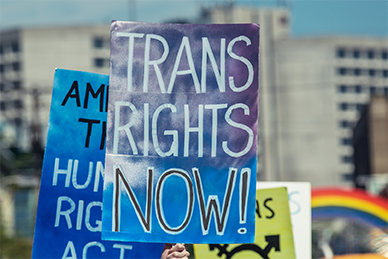Back in 2020 we provided an outline of some of the issues raised by "conversion practices" bans and why we oppose them. The article below prepared by Women's Forum Australia provides an update to many of those concerns. It is republished here with permission to assist schools and school boards in understanding some of these issues.
Activists around the world are clearly targeting both professional bodies and legislatures as a means of lending authority to their preferred, psychology-free “affirmation only” approach to the treatment of young people with gender dysphoria. The recent decision by the UK government to exclude “gender identity” from its proposed new “conversion therapy” legislation, should prompt a reconsideration of similar legislation that has already been enacted in Australia. It becomes a matter of some urgency that we establish whether and to what extent peak bodies and politicians are responding to an activist wish list at the expense of scientifically supported and proven professional best practice.
Anyone who fails to affirm an incongruent gender identity in even a very young, traumatised, mentally compromised child; anyone who enquires into the aetiology of that gender identity; anyone who seeks to reconcile that child with their bodily sex, now risks imprisonment."
So far, laws prohibiting “conversion therapy” have been enacted in Queensland, the ACT and Victoria. The Victorian legislation is the most extreme example, its declared purpose being:
(a) to denounce and give statutory recognition to the serious harm caused by change or suppression practices; and
(b) to affirm that a person's sexual orientation or gender identity is not broken and in need of fixing; and
(c) to affirm that no sexual orientation or gender identity constitutes a disorder, disease, illness, deficiency or shortcoming; and
(d) to affirm that change or suppression practices are deceptive and harmful both to the person subject to the change or suppression practices and to the community as a whole.
By any reckoning, it is extraordinary to find a government making such sweeping pronouncements on complex issues which vary from one case to another and are still the subject of complex professional debate.
Further reading reveals that the definitions of “sexual orientation” and “gender identity” and the scope of the prohibited practices are so broad as to capture many behaviours or statements of belief that simply contradict the doctrinaire teachings of queer theory. According to this ideology, all adverse outcomes for sexual minority or gender diverse individuals can be confidently attributed to the single cause of “social stigma” or minority stress. The solution to these problems is to de-stigmatise “queerness” and to emphasise the normalcy of gender diversity as part of the human experience. Victoria’s legislation contemplates criminal penalties for up to 10 years for offenders but arguably the greatest victory for the activists who promoted this legislation is the facility to prescribe “re-education” for citizens who fail to comply with their new moral code.
Among the numerous problems that arise from this effort to impose an ideology on a population by means of legislation is the fact that these new laws constrain the conversations that mental health professionals can now engage in with their LGBTIQ+ patients. By government fiat, the controversial “affirmation only” approach to gender transitioning is now the only available treatment option for gender diverse individuals in Victoria. Anyone who fails to affirm an incongruent gender identity in even a very young, traumatised, mentally compromised child; anyone who enquires into the aetiology of that gender identity; anyone who seeks to reconcile that child with their bodily sex, now risks imprisonment.

It becomes a matter of some urgency that we establish whether and to what extent peak bodies and politicians are responding to an activist wish list at the expense of scientifically supported and proven professional best practice. "
Such a law only makes sense if there is cast iron certainty that the “affirmation only” approach is always, without exception, the correct treatment for everyone. As the international trend away from the “affirmation only” approach reveals, no such certainty exists and uncertainty is growing. If interventions to help gender dysphoric patients are to have good outcomes, we need to ensure that the law, and professional standards are being established in response to sound evidence rather than simply in response to pressure from political activists. Australia could learn a thing or two by pausing to observe the UK’s different approach to this issue.
Until very recently, the UK was proposing legislation to prohibit “conversion therapy” or efforts to change another person’s “gender identity” or “sexual orientation” along the lines of Victoria’s. The government consultation closed in February and a bill was anticipated in the European spring. Activists who had worked hard to promote the new legislation were therefore vocal in their outrage when the UK government first proposed abandoning the project altogether and then agreed to proceed with a new law but one that covered only “sexual orientation”, not “gender identity”.
According to UK observers, the decision to remove “gender identity” from the proposed conversion therapy prohibitions came in response to the March publication of Dr Hilary Cass’s interim report of findings from her investigation into the operation of the Tavistock’s Gender Identity Development (GID) clinic. Cass’s headline findings included the fact that the GID clinic – which is the UK’s only gender service for young people – had sidestepped the “normal quality controls that are typically applied when new or innovative treatments are introduced” and that the experimental hormone treatments currently on offer are “not a safe or viable long-term option” for children and young people.

This represents a significant stumbling block for the “affirmation only” approach to gender transitioning which, over the last few years, has set significant numbers of gender dysphoric children on the pathway to medical “transitioning”. As WFA has previously noted, Australia is among the western countries that have seen a sharp increase in the number of children, particularly girls and young women, being guided towards body modification – puberty blockers, cross-sex hormones and/or surgery – to relieve the distress of gender dysphoria. Indeed, Australia’s Dr Michelle Telfer, in collaboration with a team from the Royal Children’s Hospital Gender Service in Melbourne, authored the world’s first “Australian Standards of Care and Treatment Guidelines for Trans and Gender Diverse Children and Adolescents”, which steps clinicians through the “affirmation-only” model of care now being called into question by Cass and others.
The alternative to medical and surgical gender “affirmation” still being recommended by mental health professionals around the world emphasises the importance of individualised psychosocial assessment and interventions (e.g. psychoeducation, individual therapy, school-home liaison, family therapy) as first-line treatments for young people with gender dysphoria or incongruence. This is the approach recommended, for example, in the Guide for Health Practitioners released last year by Australia’s National Association of Practising Psychiatrists. It is the approach being advocated now by Finland, Sweden and a number of US states. We can now anticipate that the UK will shortly follow in the same direction.
Psychological interventions have the advantage of helping patients avoid medical treatments with unknown long-term side effects and the risk of transition regret. At the very least, psychological interventions might serve as an interim measure, allowing irreversible decisions to be postponed for a time when the child’s physical and cognitive capacities have fully developed. Where all the experts, including Telfer, acknowledge that 80%−95% of gender dysphoric children will reconcile to a gender identity in congruence with their biological sex over the course of an uninterrupted puberty, the rationale for medical interventions in young people (even before puberty) is by no means robust.

However, if mental health interventions satisfy the ethical requirement to “first do no harm”, they also run directly counter to the efforts of LGBTIQ+ lobbyists to dissociate transgender, gender diverse or non-binary gender identities from the realm of mental pathology. If stigma, minority stress and “othering” are the most significant factors driving adverse outcomes for gender diverse individuals, then confirming the association of gender diversity with a mental health diagnosis works counter to the activist project.
For this reason, activists have been working for many years to change the formal diagnostic criteria relating to gender diversity in the American Psychiatric Association’s Diagnostic and Statistical Manual of Mental Disorders (DSM). As the internationally recognised authority on mental illness, the DSM serves as the standard of what is, and is not, psychologically normal. The potential for the DSM to operate as a powerful tool for political advocacy has been well-recognised by activists and professionals alike for decades. It is hardly a secret that many changes to the DSM have resulted from activist agitation, rather than organic developments in science. We can see the efforts of activism, for example, in the 2013 decision to drop “Gender Identity Disorder” from the DSM-IV and replace it with “Gender Dysphoria”. This is a sort of compromise, allowing the considerable costs associated with “transgender health” to be claimed on insurance while maintaining the fine distinction that it is not gender incongruence per se that requires treatment but only the distress that arises from gender incongruence.
Similarly, statements from peak professional bodies that claim to represent the collective wisdom of many thousands of professionals, are ultimately decided upon by a handful of individuals. Nicholas Cummings (former President of the American Psychological Association) and Quentin van Meter have both explained and decried the process that has seen reputable professional peak bodies ideologically captured and turned by degrees from pure adherence to science, toward support of an ideologically-driven political agenda.
In her recent article, “Trans activism before medical standards”, Stephanie Davies-Arai observes with consternation the extent to which the UK’s peak professional bodies are echoing the ideology, even the terminology, of activist groups, in their calls for a full ban on conversion therapy for all adults as well as under-18s. She asks the important question: “Why are professional health bodies supporting the political activism of lobby groups on this issue?”.
We don’t have to look far to find the same symptoms of ideological capture in Australia’s professional peak bodies. Both the Australian Medical Association (AMA) and the Australian Psychological Society (APS) have released position statements (here and here) that call on legislatures around the country to “ban coercive ‘conversion’ practices that intend to change, alter or suppress a person’s sexual orientation or gender identity”.
Meanwhile, members of these professional bodies are still perplexed at the lack of evidence for such a stance. Dianna Kenny, former Professor of Psychology at the University of Sydney, is one notable critic of the APS’s public statements on this subject, and the work of A/Prof Damien Riggs, the APS’s appointed “gender expert”, in particular. Riggs’s Google Scholar profile reveals that his chief loyalty is to queer theory. His testimony before parliamentary inquiries demonstrates a peculiar approach to objective evidence, science or fact and betrays an ideological, rather than a discipline-driven, approach to his subject. Riggs has declined invitations to debate Kenny’s evidence-based contention that social contagion is a significant driver of the current spike in gender dysphoria and rapid onset gender dysphoria (ROGD) particularly affecting teenage girls.
Other members of Kenny’s profession, who lack her public platform, clearly share her concerns. Only this week, buried in the comments section of a gender-related article in The Australian, we find this contribution from “Jane”:
I am a psychiatrist who has developed an interest in gender dysphoria over the last 4 years. Last December I presented on the controversies of gender dysphoria to psychiatric colleagues. The talk went for an hour and after my colleagues all remained for a further 30 minutes to discuss the topic. One made the comment that they were pleased to be able to engage in robust discussion about gender dysphoria, and that one of the greatest concerns about GD was that discussion tended to be shut down. That unlike any other issue in psychiatry this seemed to be uniquely taboo. This is an unhealthy situation and will not deliver good outcomes for people with gender dysphoria and their families."
Jane is right. Robust discussion is a necessary stage in the development of best practice. In creating penalties for “wrong think”, conversion therapy legislation like Victoria’s renders such discussion impossible. The people who stand to suffer the most are the very people who the government insists will be most helped by such laws – gender dysphoric children and teenagers.
The only conclusion to be drawn from this is that, like the UK, Australia should draw back from legislation that represents government overreach into previously sacred areas of its citizen’s private lives, such as the rights of patients to dictate their own treatment goals, the confidentiality of patient-doctor discussions, even the private conversations of families around the kitchen table. It is not the business of government either to “denounce” or “affirm” matters that are still undecided within professional practice. By ensuring access to psychological assistance is confounded by threat of imprisonment, Victoria’s government has ensured that all gender dysphoric children have only one treatment option: a question-free pathway to experimental hormone treatments that, as other countries are now finding, are “not a safe or viable long-term option” for children and young people.
